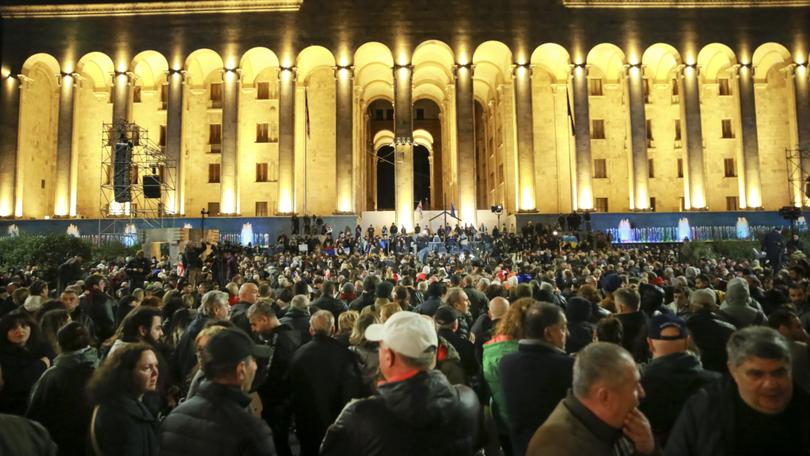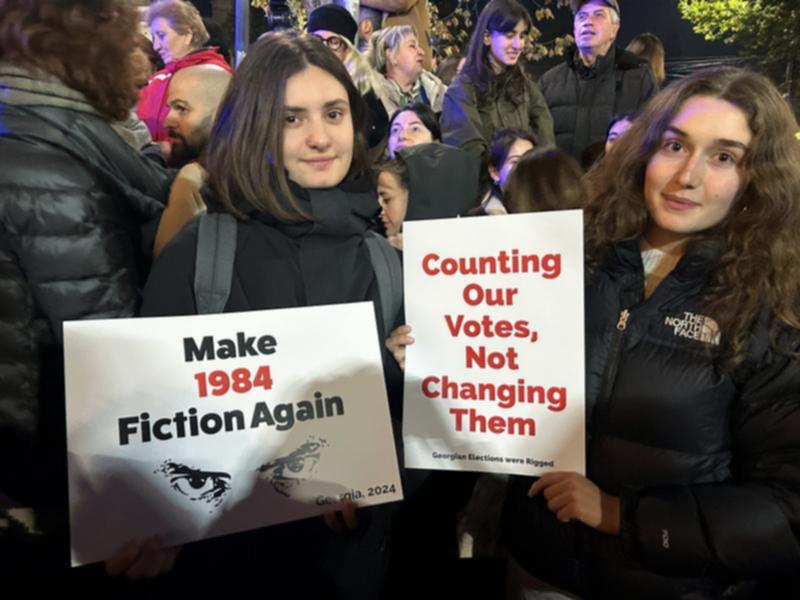Georgia election: Thousands rally to denounce 'rigged' Georgian Dream Party win, accuse Russia of interference
Thousands of Georgians massed in front of the country's parliament to denounce the result of the election that the president says was rigged.

Georgia’s president has urged the West to support opposition protests after the governing party was declared the winner of a parliamentary election that she alleged was rigged with the help of Russia.
“You did not lose the election,” President Salome Zourabichvili told thousands of pro-Europe demonstrators who massed outside a floodlit parliament building on Monday night.
“They stole your vote and tried to steal your future, but no one has the right to do that and you will not let anyone do that!”
Sign up to The Nightly's newsletters.
Get the first look at the digital newspaper, curated daily stories and breaking headlines delivered to your inbox.
By continuing you agree to our Terms and Privacy Policy.Ms Zourabichvili told the flag-waving protesters that she would defend the South Caucasus nation’s path towards Europe against the governing Georgian Dream party.
“We have no alternative and nothing else we want to leave this country for the next generations,” she said.
Protester Natia Chachava, wrapped in the Georgian flag, said the demonstrators “don’t want Russia, we don’t want to (go) back to Russia or back to the Soviet Union.”
Ms Zourabichvili, who refused to recognise the official results, earlier told The Associated Press that Georgia has fallen victim to Russian pressure against joining the EU.
“We’ve seen that Russian propaganda was directly used,” said Ms Zourabichvili, a fierce critic of Georgian Dream.

She said the government has been “working hand-in-hand with Russia,” and “probably” received help from Moscow’s security services.
The US and the European Union urged full investigations of the result of Saturday’s election.
“Georgians, like all Europeans, must be masters of their own destiny,” said EU Commission President Ursula von der Leyen.
The Central Election Commission said the Georgian Dream party received 54.8 per cent of the vote with almost all ballots counted.
The party — established by Bidzina Ivanishvili, a shadowy billionaire who made his fortune in Russia — has become increasingly authoritarian in the past year, adopting laws similar to those used by the Kremlin to crack down on freedom of speech and LGBTQ+ rights.
Protest is the only way Georgians can “express that their votes have been stolen, that their future has been stolen,” Ms Zourabichvili told AP in an interview.
She said she hopes the US and EU back the demonstrations.
“We need to have the firm support of our European partners, of our American partners,” Ms Zourabichvili said, adding that it was in the interests of “a powerful Europe” to be present in the Caucasus and for the region to be stable.
Asked if she wants sanctions imposed on Georgian officials, Ms Zourabichvili told AP that it’s up to Western leaders but that “certainly time has not come to to renew relations with authorities that are not legitimate at this point.”
US Secretary of State Antony Blinken urged Georgia’s political leaders to “respect the rule of law, repeal legislation that undermines fundamental freedoms, address deficiencies in the electoral process, and move Georgia toward its Euro-Atlantic future.”
He called for a full investigation of all reports of election-related violations, as did EU Commission spokeswoman Nabila Massrali, who said Georgian Dream’s campaign was “directly inspired” by Russian propaganda and there were “unprecedented levels of disinformation”.
The Kremlin has rejected the accusations of interference.
“We aren’t meddling in Georgia’s internal affairs, and we have no intention of meddling,” Kremlin spokesman Dmitry Peskov said.
Parliament speaker Shalva Papuashvili, a member of Georgian Dream, accused the president of creating “a coup scenario” that goes “against the constitutional order and democratic elections.”
In Georgia’s political system, the presidency is a largely ceremonial post.
The EU suspended Georgia’s membership application process indefinitely because of a Russian-style “foreign influence law” passed in June.
Many Georgians viewed Saturday’s vote as a pivotal referendum on the opportunity to join the EU.
The election campaign in the nation of 3.7 million people, which borders Russia, was marked by a bitter fight for votes and allegations of a smear campaign.
European observers said the election took place in a “divisive” environment marked by intimidation and instances of vote-buying, double voting and physical violence.
During the campaign, Georgian Dream used “anti-Western and hostile rhetoric ... promoted Russian misinformation, manipulations, and conspiracy theories,” said Antonio López-Istúriz White, head of the European Parliament monitoring delegation.
